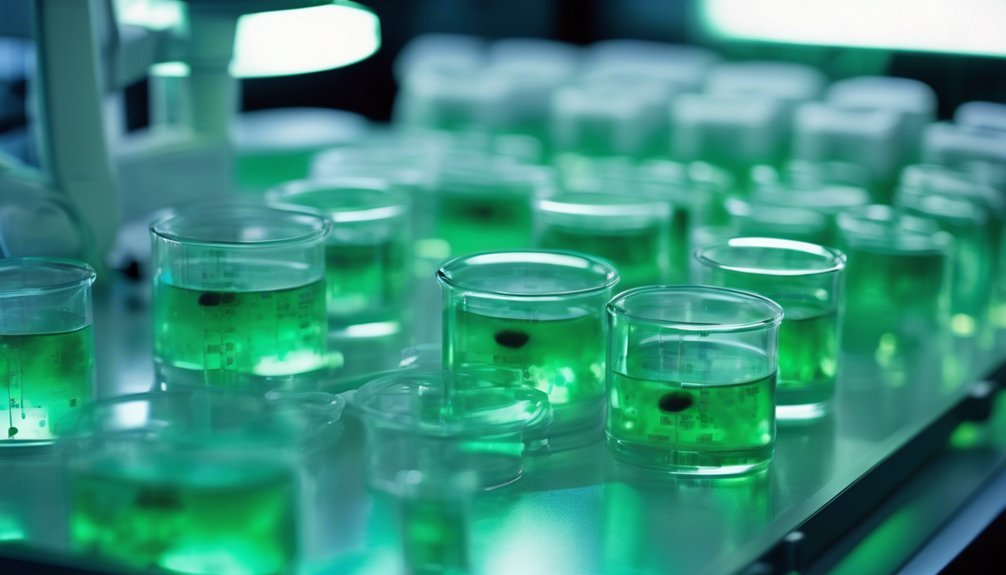You might be surprised to discover that a simple compound like sulforaphane, commonly found in everyday vegetables, holds such promise in the fight against cancer. Its intricate mechanisms and multifaceted effects on tumor cells have intrigued researchers and health enthusiasts alike. Understanding the nuances of how sulforaphane interacts with cancer cells could revolutionize how we approach cancer treatment and prevention.
Key Takeaways
- Sulforaphane inhibits cancer cell growth and induces apoptosis.
- It modulates cellular signaling pathways and boosts the immune response against cancer.
- Sulforaphane targets multiple tumorigenesis pathways for cancer prevention.
- It possesses anti-inflammatory and antioxidant effects, reducing inflammation linked to cancer.
- Research demonstrates sulforaphane's efficacy in reducing tumor growth and enhancing chemotherapy.
Sulforaphane Basics
Sulforaphane, a bioactive compound found in cruciferous vegetables like broccoli and kale, is gaining recognition for its potent anti-cancer properties. Research has shown that sulforaphane benefits include its ability to induce phase 2 detoxification enzymes, which play a crucial role in neutralizing harmful substances and protecting cells from damage.
Additionally, sulforaphane has been found to inhibit the growth of cancer cells and induce apoptosis, or programmed cell death, in various types of cancers.
Studies have also highlighted sulforaphane's potential in preventing cancer development by targeting multiple pathways involved in tumorigenesis. This compound has demonstrated anti-inflammatory and antioxidant effects, further contributing to its anti-cancer properties.
Sulforaphane research continues to explore its mechanisms of action and potential applications in cancer prevention and treatment.
Sources of Sulforaphane
Derived primarily from cruciferous vegetables, sulforaphane is a potent bioactive compound that has garnered attention for its remarkable anti-cancer properties. When looking to incorporate sulforaphane into your diet, here are some key sources and cooking techniques to consider:
- Food Sources:
- Broccoli: One of the richest sources of sulforaphane, especially when consumed raw or lightly cooked.
- Brussels sprouts: Contains significant amounts of sulforaphane and can be enjoyed roasted or steamed.
- Kale: A versatile leafy green that can be added to salads, smoothies, or lightly sautéed to retain sulforaphane content.
- Cooking Techniques:
- Light Steaming: Cooking cruciferous vegetables like broccoli and Brussels sprouts through light steaming helps preserve the sulforaphane content.
- Quick Stir-Frying: Stir-frying these vegetables for a short duration at high heat can also help retain sulforaphane levels.
- Raw Consumption: Eating cruciferous vegetables raw, like in salads or smoothies, can provide a direct source of sulforaphane.
Anti-Cancer Mechanisms
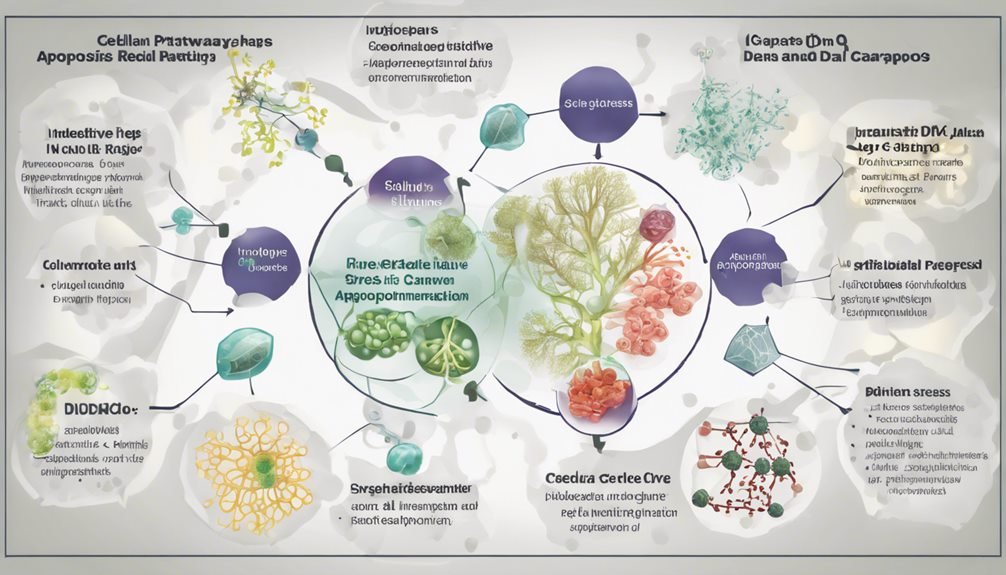
Harnessing its potent bioactive properties, sulforaphane demonstrates compelling anti-cancer mechanisms that have intrigued researchers and health enthusiasts alike.
One key mechanism through which sulforaphane exerts its anti-cancer effects is by modulating cellular signaling pathways. Studies have shown that sulforaphane can influence various signaling molecules involved in cell growth, differentiation, and apoptosis. By targeting these pathways, sulforaphane helps regulate abnormal cell behavior and inhibit cancer progression.
Furthermore, sulforaphane has been found to enhance the immune response against cancer cells. This natural compound can stimulate the production of immune cells, such as T cells and natural killer cells, which play a crucial role in identifying and destroying cancerous cells. By boosting the immune system's ability to recognize and eliminate cancer cells, sulforaphane acts as a valuable ally in the fight against cancer.
Inhibiting Cancer Cell Growth
To impede the growth of cancer cells, researchers have extensively studied the inhibitory effects of sulforaphane, a bioactive compound renowned for its potential in combating cancer. Sulforaphane has shown promising results in inhibiting cancer cell growth through various mechanisms, primarily affecting the cell cycle.
Here are three key ways sulforaphane inhibits cancer cell growth:
- Cancer Prevention: Sulforaphane has been found to induce cell cycle arrest in cancer cells, preventing their uncontrolled growth and proliferation. By interfering with the cell cycle, sulforaphane can halt the progression of cancerous cells, ultimately impeding tumor development.
- Cell Cycle Regulation: Studies have demonstrated that sulforaphane modulates key regulators of the cell cycle, such as cyclins and cyclin-dependent kinases (CDKs). By regulating these cell cycle proteins, sulforaphane can disrupt the abnormal cell division that characterizes cancer growth.
- Apoptosis Induction: Sulforaphane has also been shown to promote apoptosis, or programmed cell death, in cancer cells. By triggering apoptosis, sulforaphane can eliminate cancerous cells, further inhibiting their growth and spread.
Through its impact on the cell cycle and cancer prevention mechanisms, sulforaphane emerges as a potent anti-cancer agent with significant potential in impeding cancer cell growth.
Reducing Inflammation
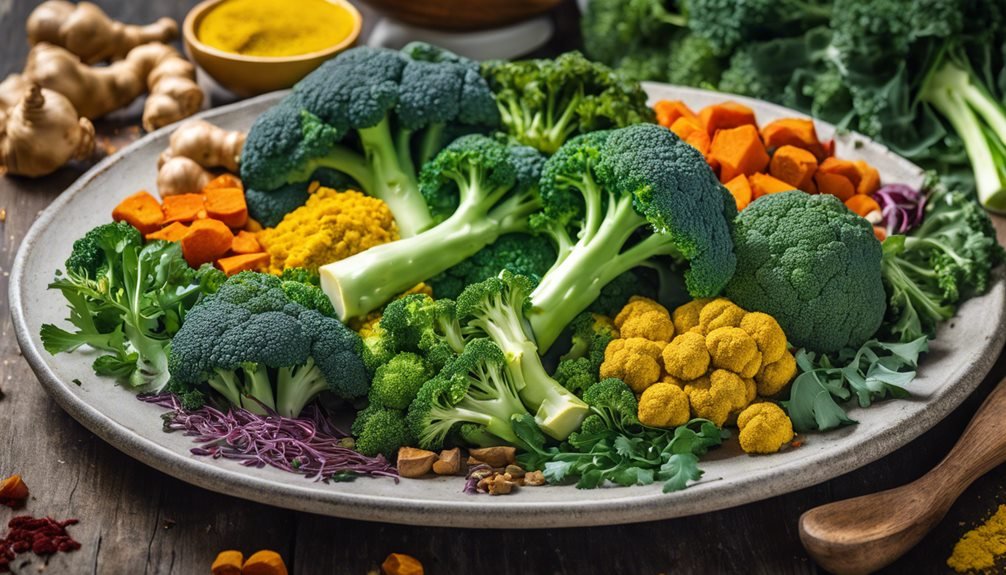
Having explored sulforaphane's efficacy in inhibiting cancer cell growth through various mechanisms, it's imperative to shift the focus towards its potential in reducing inflammation. Chronic inflammation is a known factor in the development and progression of many diseases, including cancer. Studies have shown that sulforaphane can help reduce inflammation markers in the body. By modulating key signaling pathways involved in inflammatory responses, sulforaphane has demonstrated the ability to decrease the production of pro-inflammatory molecules.
Dietary interventions rich in sulforaphane, such as cruciferous vegetables like broccoli and Brussels sprouts, have been associated with lower levels of inflammation in the body. Sulforaphane's anti-inflammatory properties make it a promising candidate for managing conditions where inflammation plays a significant role.
Promoting Detoxification
Promoting detoxification plays a crucial role in maintaining optimal health and wellness. Sulforaphane, a powerful compound found in cruciferous vegetables like broccoli, has been shown to support the body's detoxification processes. Here's how it can benefit you:
- Liver Support: Sulforaphane promotes liver health by enhancing the production of detoxification enzymes, helping the liver efficiently break down harmful substances.
- Cellular Protection: By activating Nrf2, a key regulator of cellular defense mechanisms, sulforaphane helps protect cells from oxidative stress and damage, supporting overall cellular health.
- Gut Health and Immune Function: Sulforaphane also plays a role in promoting gut health by supporting the growth of beneficial gut bacteria, which in turn can positively impact immune function. A healthy gut is essential for a strong immune system and overall well-being.
Incorporating sulforaphane-rich foods into your diet can be a proactive way to promote detoxification and support your body's natural defense mechanisms.
Sulforaphane and Apoptosis
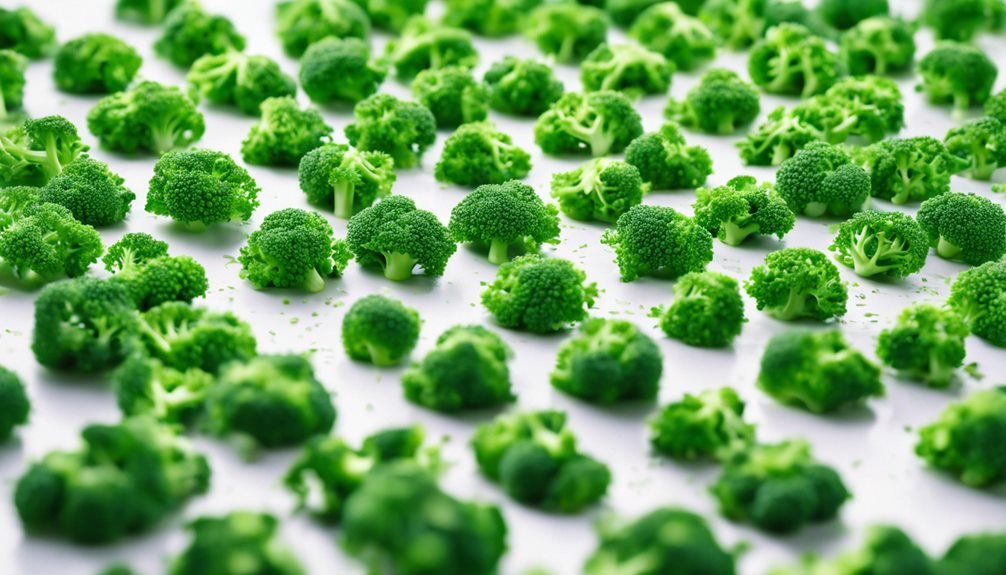
Sulforaphane's impact on apoptosis, the programmed cell death process crucial for maintaining tissue homeostasis, presents a fascinating avenue for exploring its potential as an anti-cancer agent. Research indicates that sulforaphane can induce apoptosis in cancer cells through various mechanisms. One key pathway is its ability to regulate autophagy, the process by which cells degrade and recycle components, influencing cell survival.
By modulating autophagy, sulforaphane can promote cancer cell death, thereby inhibiting tumor growth. Moreover, sulforaphane's role in combating oxidative stress is closely linked to its apoptotic effects. Oxidative stress can contribute to the development and progression of cancer by damaging DNA and promoting cell proliferation.
Sulforaphane's antioxidant properties help mitigate oxidative stress, reducing the risk of cancer initiation and progression. This dual action of inducing apoptosis through autophagy regulation and combating oxidative stress underscores sulforaphane's potential as a powerful anti-cancer agent. Further research into these mechanisms could pave the way for novel therapeutic strategies in cancer treatment.
Clinical Studies on Sulforaphane
The promising effects of sulforaphane on apoptosis and oxidative stress in cancer cells have sparked interest in exploring its potential clinical applications. Clinical studies have shown promising results, paving the way for future applications of sulforaphane in cancer treatment.
Some key findings from these studies include:
- Anticancer Properties: Research has demonstrated that sulforaphane exhibits potent anti-cancer properties by inducing apoptosis in various types of cancer cells, inhibiting tumor growth, and reducing metastasis.
- Long-Term Effects: Studies have also begun to investigate the long-term effects of sulforaphane consumption, showing potential benefits in cancer prevention and overall health maintenance. Long-term administration of sulforaphane has been linked to reduced cancer recurrence rates and improved survival outcomes in cancer patients.
- Clinical Efficacy: Clinical trials have indicated that sulforaphane is well-tolerated by patients and can be a valuable addition to traditional cancer treatments. Ongoing research aims to further explore the clinical efficacy of sulforaphane in different cancer types and treatment regimens.
Sulforaphane Bioavailability
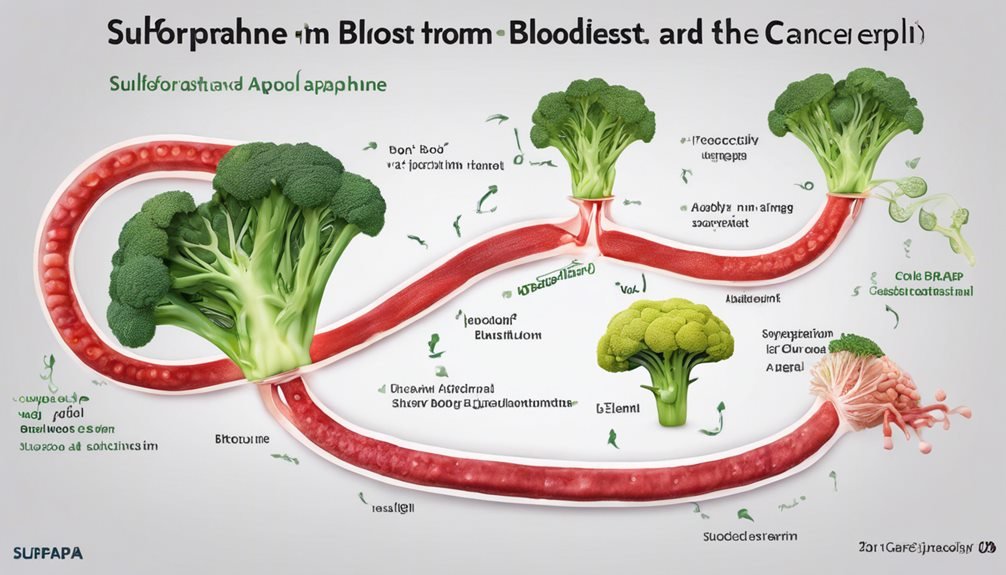
Research on sulforaphane bioavailability has garnered significant attention in the scientific community due to its implications for the effectiveness of this compound in cancer treatment. Bioavailability studies have shown that sulforaphane, a potent anti-cancer agent found in cruciferous vegetables, is well-absorbed by the body, making it a promising candidate for therapeutic use. Understanding how efficiently sulforaphane is absorbed and utilized by the body is crucial for optimizing its anti-cancer effects.
| Bioavailability Studies | Findings |
|---|---|
| 1. Absorption Rate | High |
| 2. Metabolism | Rapid |
| 3. Tissue Distribution | Broad |
Studies have indicated that sulforaphane is rapidly absorbed after ingestion and efficiently distributed to various tissues, allowing it to exert its anti-cancer properties effectively. The high absorption rate and broad tissue distribution make sulforaphane a promising natural compound for cancer prevention and treatment. Further research into enhancing sulforaphane bioavailability could lead to improved therapeutic outcomes in cancer patients.
Combating Different Cancer Types
Studying the effects of sulforaphane on various types of cancer reveals its potential as a versatile anti-cancer agent with promising therapeutic benefits. Sulforaphane targets specific molecular pathways within cancer cells, inhibiting their growth and promoting apoptosis.
Here are three key ways sulforaphane combats different cancer types:
- Molecular Targets: Sulforaphane has been shown to target multiple molecular pathways involved in cancer development, including inflammation, oxidative stress, and angiogenesis. By modulating these pathways, sulforaphane exerts anti-cancer effects on various types of cancers.
- Therapeutic Potential: Research suggests that sulforaphane possesses therapeutic potential against a wide range of cancers, such as breast, prostate, lung, colon, and skin cancers. Its ability to target different molecular pathways makes it a promising candidate for combination therapies or as an adjuvant to conventional cancer treatments.
- Clinical Studies: Several clinical studies have demonstrated the efficacy of sulforaphane in reducing tumor growth, enhancing the effectiveness of chemotherapy, and reducing the risk of cancer recurrence. These findings highlight the importance of further exploring sulforaphane's therapeutic potential in combating different cancer types.
Sulforaphane Supplements
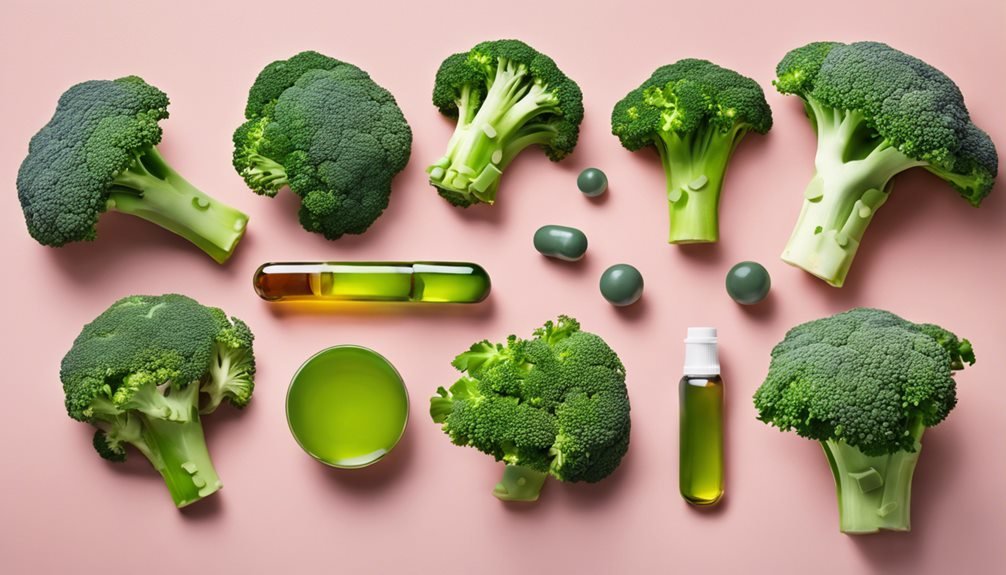
Considering the rising interest in natural remedies for cancer prevention and treatment, the use of sulforaphane supplements has garnered attention for their potential health benefits. Sulforaphane, a compound found in cruciferous vegetables like broccoli, has shown promising anti-cancer properties. Research indicates that sulforaphane benefits include inhibiting the growth of cancer cells, reducing inflammation, and enhancing detoxification processes in the body.
When it comes to sulforaphane dosage, studies suggest that a daily intake of around 20-40mg is effective for health benefits. However, it's essential to consult with a healthcare provider before starting any new supplement regimen, as individual needs may vary.
Sulforaphane supplements are available in various forms, such as capsules or powders, making it convenient for those looking to incorporate this compound into their daily routine. As with any supplement, it's crucial to choose a reputable source to ensure quality and efficacy.
Integrating Sulforaphane Into Diet
Enhancing your dietary intake with sulforaphane can offer a proactive approach to promoting overall health and potentially reducing the risk of certain diseases. When integrating sulforaphane into your diet, consider the following:
Ways to Include Sulforaphane in Your Diet:
- Cooking Methods:
- Opt for steaming or stir-frying cruciferous vegetables like broccoli, Brussels sprouts, and kale to retain maximum sulforaphane content.
- Meal Planning:
- Plan your meals to incorporate sulforaphane-rich foods regularly, ensuring a consistent intake of this powerful compound.
- Recipe Variation:
- Explore different recipes that highlight sulforaphane sources, such as adding raw broccoli to salads or preparing a flavorful broccoli stir-fry with garlic and ginger.
Frequently Asked Questions
Can Sulforaphane Be Used as a Preventative Measure Against Cancer?
Yes, sulforaphane can potentially be used as a preventative measure against cancer. Clinical trials have shown promising results, but the long-term effects need further investigation. It's essential to consult with healthcare professionals before incorporating sulforaphane into your routine.
Monitoring ongoing research and discussing potential benefits and risks with medical experts will help make informed decisions regarding cancer prevention strategies.
How Does Sulforaphane Compare to Traditional Cancer Treatments?
When comparing sulforaphane to traditional cancer treatments, efficacy is a crucial factor. While chemotherapy and radiation therapy are commonly used, sulforaphane has shown promise due to its ability to target cancer stem cells. Research suggests that sulforaphane may enhance the efficacy of traditional treatments or even serve as an alternative option. This opens up possibilities for more personalized and potentially effective cancer treatment strategies.
Are There Any Side Effects Associated With Sulforaphane Consumption?
When considering sulforaphane consumption, it's essential to be aware of potential risks. Although generally safe, some individuals may experience mild digestive issues like bloating or gas.
Long-term effects are still being studied, but excessive intake could lead to thyroid issues in some cases.
It's crucial to consult with a healthcare provider before adding sulforaphane supplements to your diet, especially if you have existing health conditions or are pregnant.
Can Sulforaphane Interact With Other Medications or Supplements?
Imagine a delicate dance between sulforaphane and other medications or supplements in your system. Drug interactions with sulforaphane can alter the effectiveness or safety of both substances.
Similarly, supplement combinations may lead to unexpected outcomes when paired with sulforaphane. It's crucial to consult with a healthcare professional before mixing sulforaphane with any other medications or supplements to ensure your well-being and optimize the benefits of all substances involved.
Is There a Recommended Daily Intake of Sulforaphane for Optimal Health Benefits?
For optimal health benefits, consider a daily intake of sulforaphane around 30-40mg. This dosage has shown promising long-term effects in various studies. However, individual needs may vary, so consulting a healthcare provider is recommended.
Regular consumption of sulforaphane-rich foods like broccoli sprouts or supplements can support overall well-being. Keep in mind that more research is needed to determine the exact optimal dosage for different health goals.
Conclusion
In conclusion, the evidence supporting sulforaphane as a potent anti-cancer agent is compelling. Its ability to target multiple pathways in tumorigenesis, induce phase 2 detoxification enzymes, and promote apoptosis makes it a promising candidate for cancer therapy and prevention. By incorporating sulforaphane-rich foods or supplements into your diet, you can potentially reduce inflammation, inhibit tumor growth, and support overall health. Embrace the power of sulforaphane in the fight against cancer.


